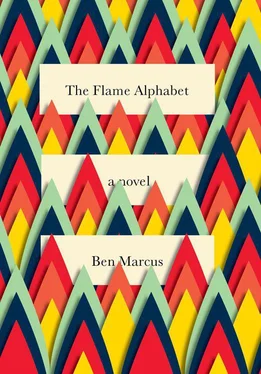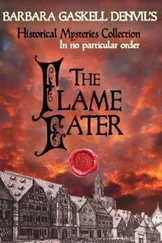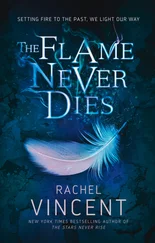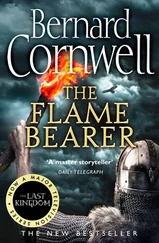I suggested, in counterargument to LeBov, that Murphy’s children were not Jewish, were they, and yet apparently they carried the toxic language as well.
Murphy nodded, perhaps too slowly.
“LeBov isn’t blaming Jewish children,” he said, carefully. “This isn’t about blame . He has profound respect for them. How can you not appreciate that kind of power? His diagnosis is medical, not political. How can we not be curious about where this thing started?”
“I thought you were suggesting that curiosity was pointless.”
“Well, maybe LeBov has a reason. Sometimes you say something unbelievable in order to promote a new idea. You build authority that way, and possibly it’s better to be doubted than believed. It is more productive to be doubted. What good is it when people believe you?”
Reading LeBov would catch me up on things, explained Murphy, but I had to be careful not to be misled. There was too much conflicting information, too many doctored broadsides attributed to him, loaded with unverified ideas. The speech cautions making the rounds, for instance, against I statements, against certain rhetoric deemed to be more toxic, attack sentences , that sort of thing, were probably not LeBov’s cautions. Even if it was possible, said Murphy, that an ultra-restricted language, operating according to a new grammar, might finally be our way out of this.
Which meant, what, that the vague worries and rules of someone who might not exist were now being called further into question?
It didn’t help that no one knew much about who LeBov really was.
Or maybe, Murphy speculated, it did help, and that was precisely the point. Maybe the best leaders are the ones we cannot really know. The misinformation coming out of Rochester wasn’t exactly an accident, he felt, but a fairly advanced strategy. They knew exactly what they were doing up there at Forsythe.
“In some ways, misinformation can be more useful at a time like this.”
I could not follow this reasoning.
Word on LeBov, said Murphy, as a for instance, was that he was childless. He was a woman. He was a teenager. Anthony LeBov was two people, a father and son. LeBov had made himself forget the English language, he self-induced aphasia through high dosages of Semantiril, or he took scheduled breaks from listening, reading, all comprehension.
Nothing was verified, but Rochester was certain, if you wanted to know where the good thinking was getting done. This was news coming out of Rochester. Forget Rochester. Rochester didn’t mean what you thought it did, said Murphy. It was said that LeBov participated in the Minnesota trials, the lab work in Denver, some study in Dunkirk of which he alone survived.
LeBov, went the story, had a chamber upstate. LeBov did cryptography. Most of the work now was in the wilted alphabet, which wasn’t even its real name. I was sure I had misheard this, but I didn’t want to interrupt. Until the world’s vocabulary got pumped through a kit, and no one could even agree on which kit to use, we wouldn’t know anything.
“The solution is in scripts, don’t you think?” he asked. It wasn’t a question for me. “Visual codes. Except not the ones we know. The ones we know are already causing problems. Reading is next. It’s not even next. It’s now.”
We had to prepare for a time, said Murphy, when communication was impossible. This thing started with children, but you were a fool to think it would stop there. Some of us were fools anyway.
“You’ve heard of the flame alphabet, of course,” said Murphy. “I’m sure I don’t need to tell you .”
Again this look of his, as if he’d reached into my head with a dowser, monitoring my reaction to see if he’d struck water.
I nodded.
I wouldn’t show him. Perhaps he was kidding, or, worse, testing me. But this was something straight from the hut, a seasonal topic of Burke’s, when he adopted tones of high caution, warnings so spectacular you could not entertain them as remotely true. If you expected to go on living, that is.
Murphy held forth on the flame alphabet as though he’d been in the hut with us. The name as deceiving shade. Nothing called by its accurate title. We’ve trafficked in an inexact language that must be translated anew. Not even translated. Destroyed. Rebuilt. The call for a new code, new lettering, a way to pass on messages that would bypass the toxic alphabet, the chemically foul speech we now used.
Some of Murphy’s rant was unfamiliar, strayed into craziness. Nothing from the hut. But other phrases seemed lifted exactly from Burke, as if he’d recorded and memorized the sermons.
The problem was that I had disregarded a lot of these sermons because—I should be honest here, and there is no one left whom I wish to deceive—these ideas bored me. Maybe I failed to understand them. Burke agonized over speechblood, an engine ripped from the language so the language would fail, and I took it for granted as the higher registers of a religion that did not always move me. The flame alphabet was the word of God, written in fire, obliterating to behold. The so-called Torah. This was public domain Jewish information, easy for Murphy to obtain. We could not say God’s true name, nor could we, if we were devoted, speak of God at all. This was basic stuff. But it was the midrashic spin on the flame alphabet that was more exclusive, spoken of only, as far as I knew, by Rabbi Burke in our hut. Since the entire alphabet comprises God’s name, Burke asserted, since it is written in every arrangement of letters, then all words reference God, do they not? That’s what words are . They are variations on his name. No matter the language. Whatever we say, we say God. This excited Burke to shouting. Therefore the language itself was, by definition, off-limits. Every single word of it. We were best to be done with it. Our time with it is nearly through. The logic was hard to deny. You could not do it.
Of course somehow I had found a way. And Rabbi Burke must have found a way, too, because he went on using language and in the end seemed stronger for it. What was Burke but disembodied speech? He showed no signs of walling himself up in silence any time soon.
If Murphy did have his own hut, it didn’t seem possible he was breaking protocol in the worst way. Speaking freely of the secrets, sharing them at length with a stranger. And if he had no hut of his own, then somehow he’d gained access to the transmissions, to our transmissions, and this he wanted me to know.
Murphy said that someone under LeBov was a troubleshooter, apparently, did speech tests, was favorable to lists. Lists were all the talk at Forsythe. Blacklists, safe lists, green lists, healing lists. There were words to fill all of them. But the healing lists, these were short, and no one was saying for sure what words were on them, not until they were tested, tested very thoroughly .
These were highly guarded lists. A small group of people would be entrusted with them, hone them in Rochester, test for toxicity only on themselves.
“Words you’d recite for medicinal purposes? Some kind of healing acoustics?” I asked.
Murphy tilted his head, grimaced, suggesting maybe, maybe not. Suggesting an idiocy he couldn’t meet halfway.
I said something about Babel. It was the easiest myth to invoke, queued up for renewed scrutiny, and it was getting batted around by anyone who believed our oldest stories still mattered. What I said was probably nothing. Maybe I only said the word Babel , let it hang out there as if that’s all that was required.
Murphy wasn’t impressed. “That topic is exhausted. Mythology is the lowest temptation. You want to talk about first causes, I’d go back before the Jewish child and cite mythology, the most sickening specimens of speech. We subscribe to these supposedly important stories, religious stories, and we ignore their inanity, how moronic and impractical they are. Can we prove the stories don’t make us sick? Because they happened long before we were born, we somehow decide they are extraordinarily important and we shut our brains down, we turn into imbeciles, we let the past start thinking for us. That’s sickness . Talk about a fucking precursor.”
Читать дальше











